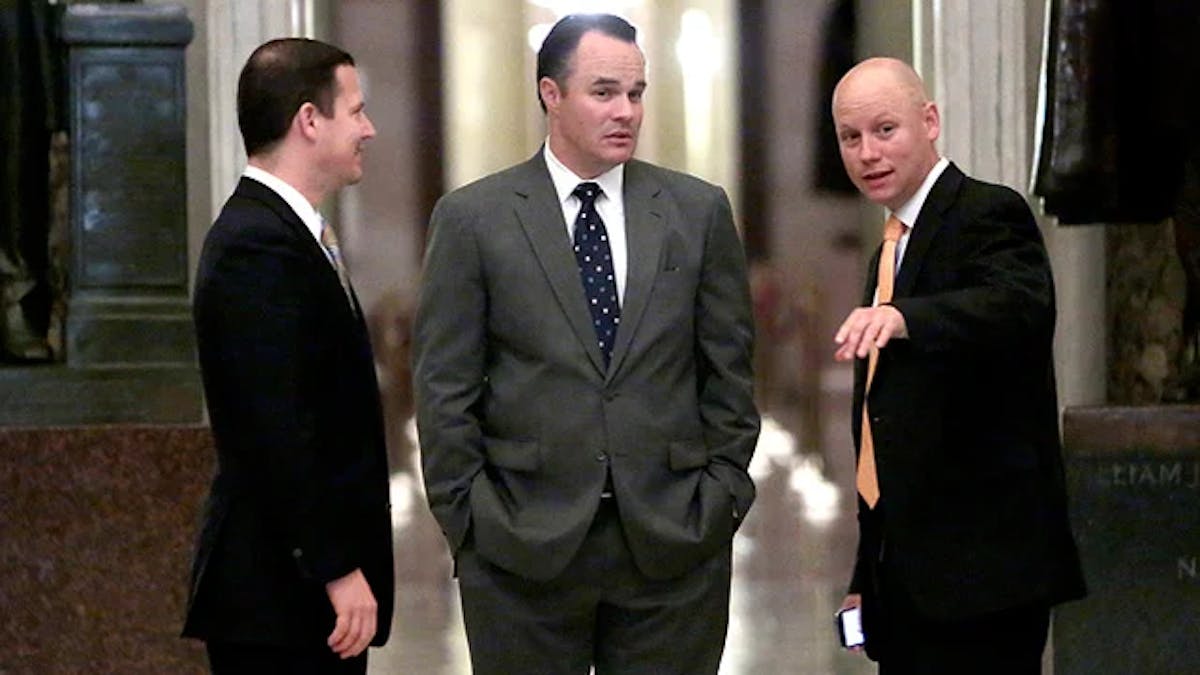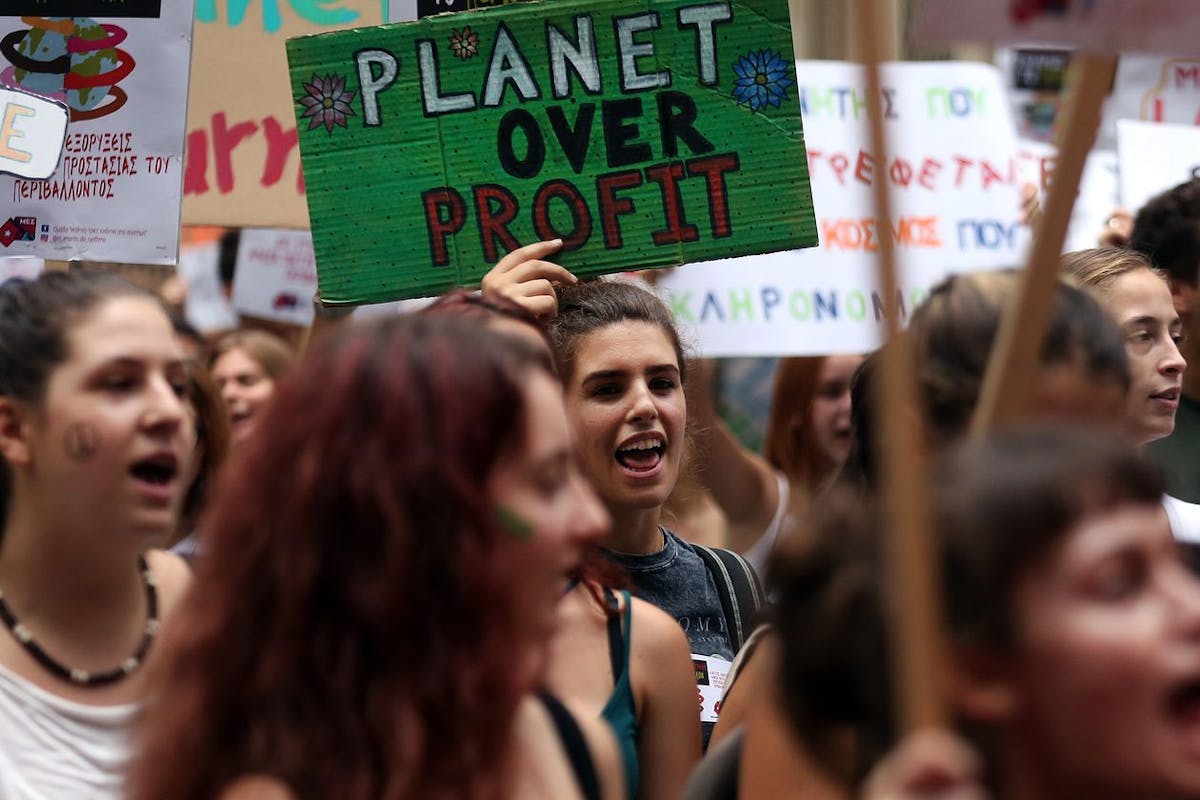This guest analysis was written by Lukas Ross, program manager at Friends of the Earth.
When it comes to the biggest lie ever told by Big Oil, climate denial is hard to beat. The decades-long campaign against established science may prove to be the most damaging lie in human history.
But the second-biggest lie is that Big Oil owes all of its success to the free market. This lie, in circulation for over a hundred years, is looking frailer than ever in the age of COVID.
That’s because the biggest transfer of wealth in American history is happening right now in plain sight. But even as corporations divert trillions in coronavirus aid away from working families, the oil industry continues to say with a straight face that it would never lobby for a handout. Take it from Mike Sommers, the CEO of Big Oil’s top trade association:
“[The American Petroleum Institute] and the oil and gas industry has not advocated for an industry specific bailout throughout this crisis. It is one of the things that I am most proud of is that this is an industry that has…really benefited from the free market in the United States and it's why this industry has grown so much over the course of the last 100 years.”
Almost nothing about this statement is true — about advocacy, about bailouts, and especially about a century of free markets. But these lies are connected, and you can’t understand the bailout unfolding today without understanding what started a hundred years ago.
The century of subsidies
The writing was on the wall for Big Oil long before the coronavirus. Like coal, it is well along the path towards inevitable decline. Unlike the relatively new factors dragging on the industry — sinking profits, rising debt, and growing skepticism from Wall Street — government programs subsidizing Big Oil have been around for more than a century.
Whether through outright theft at home or overthrown governments abroad, oil’s success has never rested on the free market. The factor that has most consistently propped it up is actually taxes. Or rather, hundreds of billions in special-interest tax breaks funneled to oil and gas companies.
Take one of the oldest giveaways on the books: the deduction for intangible drilling costs. This allows drillers to write off immediately most of the costs of developing an oil well, instead of spreading them over many years. This is a radical departure from normal accounting practices, and it’s highly profitable — like getting an interest-free loan from the federal government. The higher the drilling costs, the fatter the loan.
Big Oil has spent the past hundred years cultivating the biggest, most lucrative hidden welfare state around.
Another giveaway is the percentage depletion allowance, which allows for 15 percent of an oil well’s gross income to be deducted annually. This also diverges from how most companies account for costs under the tax code. It can allow drillers to claim deductions that exceed the value of the well itself.
To understand the true value of these incentives, consider their duration and their implications for the climate.
The deduction for intangible drilling costs dates from 1916, with some modifications over the years. Percentage depletion dates from 1926. These incentives have withstood calls for repeal by Presidents as diverse as Kennedy, Reagan, and Obama — and still, they have survived.
And they have outsized impacts on efforts to grapple with climate change. The Stockholm Environmental Institute found that nearly half of future domestic oil and gas production is “subsidy-dependent,” at an average price of $50 a barrel. Even in the Permian Basin of West Texas and New Mexico, ground zero for fracking in the United States, only 60 percent of production could proceed without subsidies. With the price of oil now hovering around $40 a barrel, drillers are more dependent than ever.
No part of the oil and gas industry has received more government support than the sector most credited with delivering energy dominance: fracking. Recent evidence suggests that fracking’s emergence may be tied to an obscure tax credit passed in 1980 that incentivized experimental drilling. The real boom, however, was financial innovation, not technology. As the journalist Bethany McLean has written, there’s little doubt that fracking boomed due to record-low interest rates set by the Fed in 2008 and the shady financial practices that followed.
Other subsidies have been added to the tab over the years. The George W. Bush administration shepherded an energy bill through Congress loaded with new incentives. In spending legislation passed in 2015, Sen. Tom Carper, a Democrat, succeeded in including a giveaway for oil refiners. Now, Republicans are insisting that any future aid for renewables be matched with comparable subsidies for drilling. All told, these handouts cost taxpayers $16 billion a year and ensure Big Oil pays some of the lowest taxes around.

Mike Sommers (center), CEO of the Big Oil trade group American Petroleum Institute, used to be a top aide to then-House Speaker John Boehner.
The political scientist Christopher Howard once called tax programs the “hidden welfare state” because deductions for products like mortgages and retirement accounts distribute massive amounts of wealth, often less controversially than spending programs like Medicaid. If this is true, then Big Oil has spent the past hundred years cultivating the biggest, most lucrative hidden welfare state around.
COVID and the backdoor bailout
When the first stimulus package passed after COVID included over $300 billion in corporate tax cuts, the details went mostly unnoticed. It was weeks before the publication of quarterly lobby filings revealed that these provisions were Big Oil’s keenest area of interest in the entire bill. Tax cuts turned out to be the perfect place to start the next bailout.
Starting in April, some of the biggest oil companies in the country began quietly disclosing massive tax refunds. The refiner Marathon Petroleum initially announced that it anticipated a check for over $400 million from the IRS — then revised that figure in its second-quarter report to $1.1 billion. Another refiner, Phillips 66, expects an effective tax rate of only 2 percent, thanks in part to the stimulus legislation. Major fracking companies like Devon, Diamondback, and QEP expect benefits of at least $100 million each.
In response to a concerted lobbying push, it appears Congress coughed up policies laser-targeted to disproportionately help these companies. The legislation even reversed two of the only things that Big Oil remotely disliked about the Trump tax cuts: a cap on the deduction for interest and the ability to deduct losses against income from previous years.
This is a lot of accounting jargon, but in plain English it means major benefits for companies suffering recent losses and companies with substantial debt burdens. The analysts at Ernst & Young agree that these provisions are uniquely generous to oil and gas, and Bloomberg News went so far as to call the initial $1.9 billion windfall a “stealth bailout.”
Oil slush fund
The largest single investment of the March stimulus was a $4.5 trillion lending slush fund, to be managed directly by the Federal Reserve but jointly supervised by Treasury Secretary Steven Mnuchin. The borrowing programs created with this money could be the US government’s biggest-ever economic intervention.
“We will never let the great U.S. Oil & Gas Industry down,” Trump tweeted in April — the same week that oil prices dropped below zero. The stimulus is his way of keeping his word. A $600 billion program dubiously dubbed Main Street Lending has already been modified twice along terms specifically sought by the oil lobby. It is now easier for bigger, more heavily indebted companies to borrow and even to refinance their pre-COVID debt. When these changes were approved, Energy Secretary Dan Brouillette did a public victory lap and declared that oil was intended to benefit. (The program has seen little participation so far, but the Fed expects to name a new list of borrowers next week.)
Other programs with potential benefits for polluters are just getting warmed up. A massive campaign to purchase corporate bonds run by the Wall Street giant BlackRock is disproportionately buying up risky oil and gas debt. Another program empowered to literally inject corporations with public money has already been deemed too restrictive by oil state Senators because only companies with decent credit can qualify — a condition that eliminates most of the fracking industry.

Climate protesters demanded change in Athens last fall.
The horror is that even companies with terrible credit are benefitting from the double-whammy of Fed support and tax cuts. Take prominent fracker EQT, not exactly a household name but nevertheless the largest natural gas producer in the country. Even though the company’s debt was downgraded to “junk” by Moody’s before the coronavirus, it was still able to borrow an additional $500 million in April, likely thanks in part to the Fed pumping money into corporate debt markets, including into investment funds that hold EQT’s risky paper. Because of COVID tax relief, EQT also got an extra $94 million for a tax refund totaling $379 million. This windfall isn’t going to protect jobs—it’s going straight to executives and to pay down Wall Street debt.
No more bailouts
These tax and Federal Reserve bailouts just delay the inevitable. With or without the government’s help, economists believe, oil and gas are on the decline. Even giant companies like ExxonMobil and Chevron have been effectively running deficits, borrowing money and cutting costs so they can spend more on dividends and buybacks even as revenues plummet. Of all the sectors in the S&P 500, oil and gas came in dead last in the stock market last year.
The problem is that after a century of corporate welfare, Big Oil’s survival has as much to do with politics as it does with the marketplace. Leveraging COVID-19 for a bailout is just the latest in a line of political interventions designed to keep these companies afloat.
The issue is speed. The story of coal proves that long after a transition is inevitable an industry can shamble on for decades. How quickly Big Oil is phased out, and how fairly its workers are treated in the process, could all be determined in the coming months.
The question of how to rebuild from COVID-19 is the most important political question in generations. If billions in aid are misspent on CEOs and debt repayments, the real victims will be the oil workers who deserve better and the climate. It is time to interrupt the bailout that began in March and then eliminate the gravy train of subsidies from a hundred years ago.
The free market won’t take care of Big Oil. It never has.
